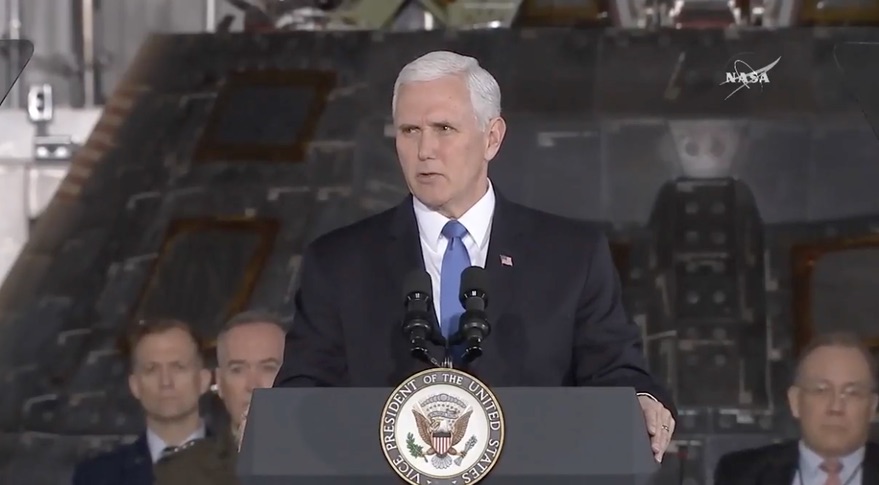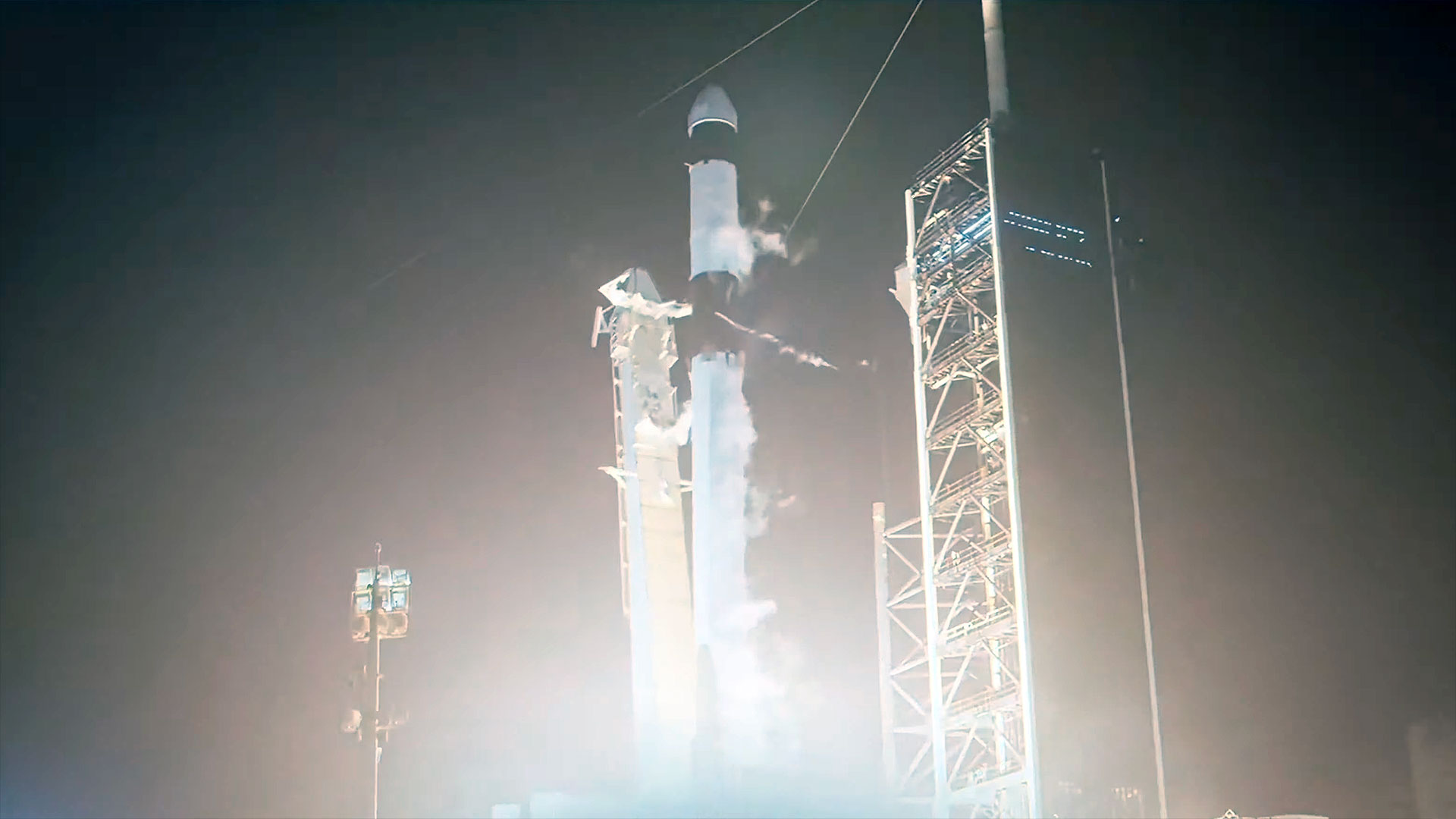National Space Council Backs Incremental Space Regulatory Reform
WASHINGTON — Vice President Mike Pence and members of the National Space Council approved a series of recommendations Feb. 21 that make modest, and expected, reforms to regulations of commercial space activities.
The Council, meeting at the Kennedy Space Center in its second public session since being reestablished last June, approved a set of four recommendations intended to streamline licensing and other regulatory activities that both government officials and industry witnesses warned could slow down emerging space ventures.
“But while American industry and technology have leaped towards the future, our government agencies too often have remained stuck in the past,” Pence said, citing regulatory uncertainty for new space activities like satellite servicing as well as "outdated regulatory processes."[Related: Trump Directs NASA to Return to the Moon, Then Aim for Mars]
An example he cited is the need for companies to seek new licenses for the same launch vehicle that flies from different locations. "You know, the government’s figured out how to honor driver's licenses across state lines," he said. "There's no reason we can't do the same for rockets."

The first recommendation approved by the Council addressed that issue, calling on the Department of Transportation to replace "prescriptive launch and re-entry licensing regimes" with a streamlined system by next March.
The recommendation didn't go into details about that plan, but the Federal Aviation Administration's Office of Commercial Space Transportation has proposed what it calls a "21st century licensing process" that would address the ability to use the same launch license at multiple sites, or for different versions of the same family of vehicle.
Jeffrey Rosen, the deputy secretary of transportation, said his department had submitted, as requested by Pence at the Council's previous meeting last October, "structural and meaningful changes to the status quo" regarding launch licensing. Those proposals, he said, included accelerated rulemaking for FAA regulations, expanded use of waivers for more immediate regulatory relief and focusing FAA resources on licensing and regulatory approvals, in addition to licensing reforms.
Get the Space.com Newsletter
Breaking space news, the latest updates on rocket launches, skywatching events and more!
A second recommendation called on consolidating the Office of Space Commerce and the Commercial Remote Sensing Regulatory Affairs Office, both within the National Oceanic Atmospheric Administration, and placing them in the office of the Secretary of Commerce.
That idea had been put forward by Secretary of Commerce Wilbur Ross in remarks earlier in the meeting as a means of streaming regulatory activities. "At the department, we're working to create a new one-stop shop for space commerce," he said. "This elevated and amplified Office of Space Commerce will coordinate all space-related functions at the department: remote sensing, spectrum policy, export controls, business and trade promotion, to name a few." He added he would soon name a director for the office, which has had only acting leadership for an extended period.
That recommendation also called for the development of a "mission authorization" scheme for commercial space activities. Such a system, versions of which have been proposed both in legislation and by the Obama administration, would provide oversight of so-called "non-traditional" commercial space activities where it is not clear what agency would provide the oversight required by the Outer Space Treaty.
Ross, in his remarks, said the department would work with industry to develop "regulations and legislation for an effective mission authorization framework" to address those regulatory uncertainties. Those proposals would be completed by July 1, he said. [In Photos: The Trump Administration and NASA]
A third recommendation approved by the Council called on the National Telecommunications and Information Administration and the Commerce Department to work with the Federal Communications Commission "to develop protections for the radio frequency spectrum facilitating commercial space activities."
"Spectrum is a scarce resource that facilitates communications, control and transmission of valuable data back to Earth," Ross said, asking the Council for "spectrum policies to support commercial space activities while respecting the needs of DOD and others."
A fourth and final recommendation asked the Council's executive secretary, Scott Pace, to work with members of the Council to develop recommendations on export control reform. Those recommendations are due at the end of the year.
Ross noted that a commercial spacecraft that lands in another country, or in international waters, is considered an export. "This approach is a primary complaint of space companies," he said. The recommendation, he said, would allow his department to continue working with the Departments of State and Defense on the issue "to enable more commercial activity while protecting national security."
One topic that did not get much attention in the recommendations is commercial remote sensing regulations, beyond the decision to consolidate the office that licenses such systems within the Office of Space Commerce. Ross noted that commercial remote sensing regulations and their underlying law date back 25 years, but did not propose specific reforms.
Others testifying before the council, though, did state the need to improve the regulatory regime for commercial remote sensing. “Remote sensing in particular has been constrained by outdated regulations that often aren’t faithfully implemented,” said Eric Stallmer, president of the Commercial Spaceflight Federation.
“While there has been great progress, the process still hinders the speed of U.S. innovation,” said Kevin O’Connell of Innovative Analytics and Training, and a former chairman of the Advisory Committee on Commercial Remote Sensing. “Slowing down or delaying commercial innovation is neither consistent with U.S. policy nor likely to be a successful strategy.”
Establishing the Users Advisory Group
Late Feb. 20, the White House announced the membership of a Users Advisory Group, a panel of outside experts that will provide advice to the Council. Nominations for the group, which will be administered by NASA on behalf of the Council, were opened in December.
"It's an extraordinary group of Americans that's bringing together some of the brightest minds in this country to accelerate innovation across our nation’s space enterprise," Pence said of the group.
The 29 members formally nominated — their appointments await approval by NASA Acting Administrator Robert Lightfoot, a formality — are heavily weighted towards industry. They feature the chief executives of most major aerospace companies, including Blue Origin, Boeing, Lockheed Martin, Northrop Grumman, Orbital ATK, Sierra Nevada and SpaceX. Executives of entrepreneurial companies are also on the committee, such as those of Relativity Space and Vox Space, the arm of Virgin Orbit that handles U.S. government business.
The panel includes several former military officials and politicians, including Alabama Gov. Kay Ivey and Newt Gingrich, former Speaker of the House. Leaders of industry groups are also on the panel, as well as several former astronauts, notably Buzz Aldrin and Eileen Collins.
Notably absent from the panel’s membership were executives with companies that provide space services, like satellite operators and commercial remote sensing companies. Few of the members of the panel have scientific backgrounds, and none are leaders of current or recently-completed NASA science missions. Only one member is from academia, Georgia Tech President G.P. Bud Peterson.
One curious inclusion is Fred Klipsch, a businessman identified in the White House release as "Founder and Chairman of Hoosiers for Quality Education." That organization is a political action committee in Indiana, the home state of Vice President Pence, that has been involved in promoting school choice, and with no obvious links to space activities.
Those nominated to the group say they hope to be able to improve national space policies by providing input to the Council. "I look forward to working with the administration to explore synergies across the government, the aerospace industry and representatives of other industries as we work together to enhance America's innovation and leadership in space," Mary Lynne Dittmar, president and chief executive of the Coalition for Deep Space Exploration, said in a Feb. 21 statement.
This story was provided by SpaceNews, dedicated to covering all aspects of the space industry.
Join our Space Forums to keep talking space on the latest missions, night sky and more! And if you have a news tip, correction or comment, let us know at: community@space.com.

Jeff Foust is a Senior Staff Writer at SpaceNews, a space industry news magazine and website, where he writes about space policy, commercial spaceflight and other aerospace industry topics. Jeff has a Ph.D. in planetary sciences from the Massachusetts Institute of Technology and earned a bachelor's degree in geophysics and planetary science from the California Institute of Technology. You can see Jeff's latest projects by following him on Twitter.










